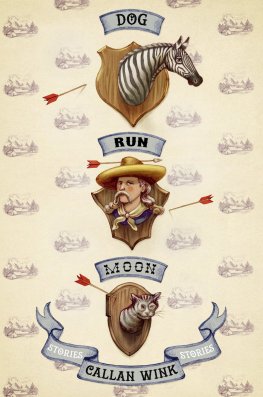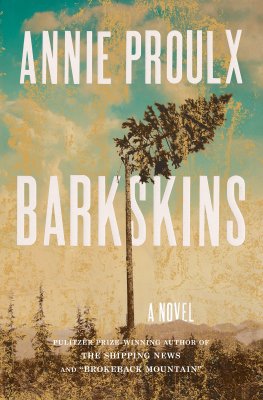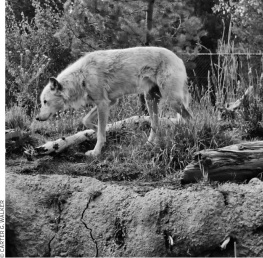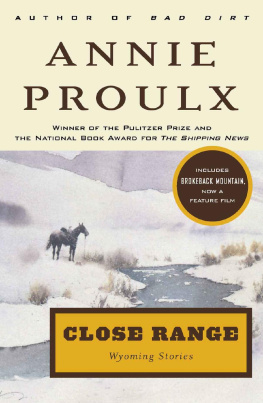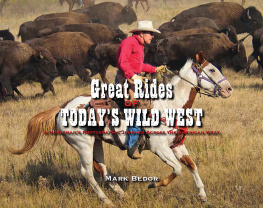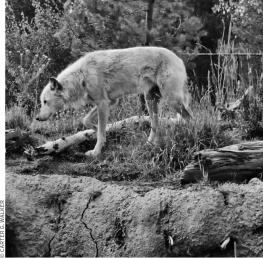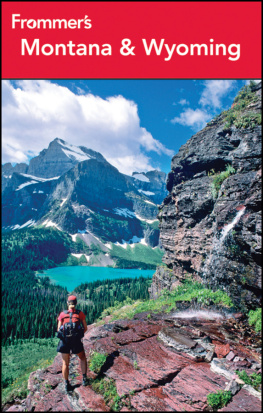Sid was a nude sleeper. Had been ever since he was a little kid. To him, wearing clothes to bed seemed strangely redundant, like wearing underwear inside your underwear or something. Sid had slept in the nude every night of his adult life and that was why, now, he was running barefoot and bare-assed across the sharp sandstone rimrock far above the lights of town. It was after two in the morning, a clear, cool, early June night with the wobbly gibbous moon up high and bright so he could see the train yard below the crisscrossing rails, a huge haphazard pile of old ties, the incinerator stack. He was sweating but he knew once he could run no more the cold would start to find its way in. After that he didnt know what would happen.
The dog was padding along tirelessly, sometimes at Sids side, sometimes ranging out and quartering back sharply, his nose up to the wind trying to cut bird scent. Not for the first time in his life Sid found himself envying a dog. Its fur. Its thick foot pads. A simple untroubled existence of sleeping, eating, running, fucking occasionally if you still had the parts, not worrying about it if you didnt. Even in his current predicament Sid couldnt help but admire the dog. A magnificent bird dog for broken country such as this, no two ways about it. Sid kept going, hobbling, feeling the sharp rimrock make raw hamburger out of the soles of his feet. When he turned he could see smears of his blood on the flat rock shining black under the moon. And then, the shafts of headlights stabbing the jutting sandstone outcroppings. He could hear the shouts of Montana Bob and Charlie Chaplin as they piloted their ATV over the rough ground.
Sid hadnt stolen the dog. Hed liberated the dog. He firmly believed this and this belief was the fundamental basis for the disagreement between himself and Montana Bob. Montana Bob thought ownership meant simple possession. Sid thought otherwise. Hed been in town for two months and his path to and from work took him twice daily through the alley. The dog would follow his passing through the chain-link and Sid would whistle and the dog would raise its ears without getting up.
Sid worked at a sawmill that processed logs brought down from the mountains. The logs came in massive and rough, smelling like moss and the dark places where snow lingers into July. They entered one end of a screeching hot pole building, met the saw, and came out the other side, flat and white and bleeding pitch into the red-dirt lumberyard. The men that worked the logs and the saw were Mexicans mostly, wide, sweating men who worked in dirty white tank tops, their inner arms scabbed and raw from wrestling rough-barked logs. They spoke their language to each other and Sid did not know them. He kept to himself and did his work. He was a scrap man. All day he took cast-off pieces of aspen and pine, and cut and stapled them into pallets that were eventually piled with boards to be shipped out. All day he measured and sawed and stapled. His hands were pitch-stained and splintered. All day his mind ran laps, and after work he walked back through the alley, whistled at the dog on his way by, and drank three glasses of water in quick succession, standing at the kitchen sink in the empty trailer he rented by the month and hadnt bothered to furnish. Even with the windows open the trailer smelled like a hot closet full of unwashed clothing, and Sid couldnt stand being there unless he was asleep.
In the evenings he drove. Sometimes over to the next town, sometimes for hours until he ended up in the river valley at the base of the mountains where it was always ten degrees cooler. She lived there now and he knew her house but he never drove by. He couldnt bear the thought of her looking out from her kitchen window to see his truck moving slowly down the street. He could imagine how his face would look to her. Sun-dark. Gaunt. Too sharp down the middle like it was creased. Sometimes he got a milkshake at the diner and nursed it for the drive. No matter where he drove, he took the same way back, the route that took him around front of the house with the dog. The house where the east-facing windows were covered with tinfoil and Sid had never seen anyone outside.
At the mill one afternoon a full pallet of eight-inch-by-twelve-foot boards broke free of the loader and crushed the legs of one of the Mexicans who had been standing by the truck, waiting to tighten the straps. Sid, eating his lunch, saw the whole thing, heard the mans hoarse screams over the shriek of the saw until the saw was silenced, and then it was just the man, pinned to the ground and writhing, his eyes bulging, with sawdust coating the sweat on his bare arms.
That evening, Sid drove straight to her house, still in his work clothes. When he got there her car was in the driveway and there was a pickup truck parked behind it. Sid pulled in sharply and got out, not bothering to shut his door behind him. He was striding fast, halfway up to her porch, before he noticed the dried smears of blood on his pant legs and boots. At the mill, he and everyone else had rushed to the man, frantically teaming up to move the heavy boards from his legs. There had been blood everywhere, making the sawdust dark, making the boards slick and red and hard to hold. Now, standing in her front lawn, he looked down at his hands. He tried to clean out the rust-colored crescents under his fingernails, tried to rub the pine pitch mixed with dried blood from the creases in his palms. He was rubbing his hands frantically on his stained jeans, when he saw movement in the curtains over the kitchen window. And then he ran, sliding into the open door of his truck, spinning gravel up onto vehicles in front of him as he backed out at full speed.
Sids route home took him past the house with the dog, and, as usual, there was no sign of life outside. The truck that was often parked in front of the house was gone. Sid passed slowly and then turned around. He thought about it for a minute and then pulled over and let his truck idle. He went around back where the dog was lying on a pile of dirty straw, chained to a sagging picnic table. The dog didnt bark, didnt even get up, just watched Sid with its muzzle resting on its front paws. Sid unhooked the chain from the dogs collar, and when he turned to leave, the dog followed him to his truck, jumped in, and sat on the bench seat, leaning forward with his nose smudging the windshield. Sid drove up to the flat, windswept bench above town and let the dog run. In the hour before it got dark they put up three coveys of Huns and two sharp-tails, the dog moving through clumps of sagebrush and cheatgrass, working against the wind like some beautifully engineered piece of machinery performing perfectly the one, the only, task to which it was suited.
Sid was afraid of Montana Bob. As he ran he could feel the fear lodged somewhere up under his sternum, a sharp little stab of something like pain with each inhaled breath. It was a healthy thing, his fear of Montana Bob. You should be afraid, Sid, he thought. You should be afraid of Montana Bob like you should be afraid of a grizzly bear, a loose dog foaming at the mouth, anything nearsighted and sick and unpredictable. Sid stopped behind the wind-twisted limbs of a pion pine and listened. He could hear the low growl of the ATV coming behind him and then the different, softer sound of the engine idling, stopped, no doubt, so that Montana Bob and Charlie Chaplin could branch out on foot to look for his sign. Sid was above them and he could see the shapes of their shadows, tall and angular, moving across the headlights, cloaked in swirling motes of red dust.
I know who you are, Sid. I know its you out there. Were still out here, too.
Montana Bobs voice came up to him, reverberating off the rock.

